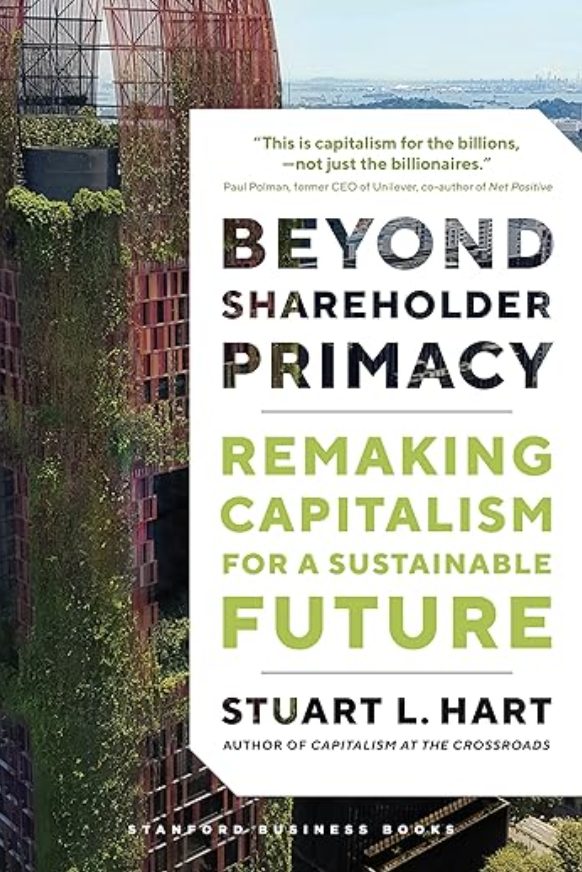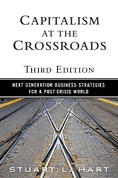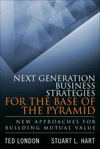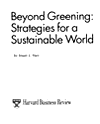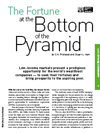Strategies for Sustainable Value

ABOUT
I'm Stuart L. Hart, a leading authority on the implications of environment and poverty for business strategy. A few years ago, I defined the concept of sustainable value; my work includes over 70 academic papers and several books.
My blog: Voice of the Planet >>
Learn more >>
BOOKS
My latest book, Beyond Shareholder Primacy: Remaking Capitalism for a Sustainable Future, published in 2024, is a call to consciousness―and action―for individuals, organizations, communities, and nations.
My best-selling book, Capitalism at the Crossroads, published in 2005, was selected by Cambridge University as one of the 50 top books on sustainability of all-time; the third edition of the book was published in 2010.
With Ted London, I'm the author of a newly released book entitled Next Generation Business Strategies for the Base of the Pyramid.
More books >>
ARTICLES
Beyond Greening: Strategies for a Sustainable World won the McKinsey Award for Best Article in the Harvard Business Review for 1997 and helped launch the movement for corporate sustainability.
With C.K. Prahalad, I wrote the pathbreaking article: The Fortune at the Bottom of the Pyramid which provided the first articulation of how business could profitably serve the needs of the four billion poor in the developing world.
The Great Leap: Driving Innovation from the Base of the Pyramid
By Stuart L. Hart and Clayton Christensen, Sloan Management Review
A Natural-Resource-Based View of the Firm
By Stuart L. Hart, Academy of Management Review
More articles >>
Articles
IN PROGRESS A Natural-Resource-Based View of the Firm: Fifteen Years After The Third Generation Corporation |
Beyond Greening: Strategies for a Sustainable World won the McKinsey Award for Best Article in the Harvard Business Review for 1997 and helped launch the movement for corporate sustainability.
---
With C.K. Prahalad, Hart also wrote the pathbreaking article: The Fortune at the Bottom of the Pyramid which provided the first articulation of how business could profitably serve the needs of the four billion poor in the developing world.
---
Innovation from the Inside Out
Erik Simanis and Stuart L. Hart, Sloan Management Review (2009)
Describes some of our latest work on how to create new businesses at the base of the pyramid that are truly "native" or "embedded" in the communities they serve. Rather than introducing innovations from the "outside-in" the article argues for a process of co-creation that develops from the "inside-out."
---
The Base of the Pyramid Protocol: Toward Next Generation BoP Strategy
Erik Simanis and Stuart L. Hart, et al (2008)
This second edition of the BoP Protocol provides a succinct guide for how to co-create BoP enterprises on the ground with local community members engaged as partners and colleagues rather than just consumers or producers.
---
In Search of Sustainable Enterprise: The Case of GE's Ecomagination Initiative Stuart L. Hart and Mark B. Milstein, Value (2006)
Applies the Sustainable Value Framework first developed in my 1997 HBR article and expanded in Hart and Milstein's 2003 article to GE's Ecomagination Initiative.
---
Expanding Possibilities at the Base of the Pyramid
Erik Simanis and Stuart L. Hart, Innovations (2006)
Analyzes the success of Kick Start's Money Maker Pump innovation and shows how important it is to provide enabling technologies which the poor can creatively adapt for their own purposes, rather than beginning with a narrow and clearly defined value proposition.
---
Developing Native Capability
Stuart L. Hart and Ted London, Stanford Social Innovation Review (2005)
Argues that successful BoP ventures must become "native" to the communities that they serve by engaging local people in the development of the enterprise itself.
---
Engaging Fringe Stakeholders for Competitive Advantage
By Stuart L. Hart and Sanjay Sharma, Academy of Management Executive (2004)
Rather than involving only known stakeholders important to existing businesses, this article makes the original case for engaging those on the periphery or "fringe" - the poor, the weak, the isolated, even the voices of other species with which we share the planet. Through "radical transactivenss" (RT), companies can build the competitive imagination necessary for future...
---
Creating Sustainable Value
By Stuart L. Hart and Mark Milstein, Academy of Management Executive (2003)
This article develops the "sustainable value framework" (first introduced in the 1997 HBR article) in depth, and shows how sustainability connects to the creation of shareholder value.
---
The Great Leap: Driving Innovation from the Base of the Pyramid
By Stuart L. Hart and Clayton Christensen, Sloan Management Review (2002)
This article shows how the four billion poor at the "base of the pyramid" provide the ideal laboratory for incubating disruptive new clean technologies, enabling them ultimately to "trickle up.
---
Global Sustainability and the Creative Destruction of Industries
By Glen Dowell, Stuart L. Hart, and Bernie Yeung, Management Science (2000)
In this empirical analysis, we find that corporations adopting a single, stringent environmental standard (versus defaulting to less stringent host country standards) have significantly higher market values. This paper won the 2001 Moskowitz Prize for best research article on social investing.
---
Does it Pay to be Green?
Stuart L. Hart and Gautam Ahuja, Business Strategy and the Environment (1996)
Among the first published pieces of empirical research on pollution prevention, this article demonstrates that corporate initiatives to reduce emissions produce cost savings within 1-2 years of initiation.
---
A Natural-Resource-Based View of the Firm
By Stuart L. Hart, Academy of Management Review (1995)
Stuart's earliest and most frequently cited academic article which proposes how the challenges of the environment and poverty can be leveraged to produce a sustainable form of competitive advantage.
---
(C) 2011 Stuart L. Hart. All Rights Reserved
Contact | Newsletter | Privacy
